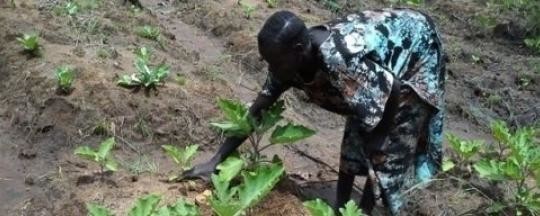Scores of farmers in Northern Bahr el-Ghazal State, with support from the UN’s Food and Agriculture Organization (UNFAO) and other Non-Governmental Organizations, have embraced horticulture but say they face several challenges.
Alakiir Bak, a young lady involved in horticulture in the state’s Ziira suburb, told Radio Tamazuj that her family does not buy vegetables from the market anymore because they harvest their own from the garden. She appealed for support.
“It is good work, but we don’t have a generator to pump water for irrigation and urea to control pests. We are now farming but the insects eat our crops, so we require urea. We also want the organizations to support us with a generator and everything we can use to irrigate our farms,” Alakiir said. “We never go to buy anything in the market, we just harvest from our gardens.
Other farmers said they were glad that their efforts are paying off because they are reaping profits but called on FAO to immediately provide them with improved seeds and farm equipment.
Deng Duang said that the work is interesting, adding that the absence of manure affects their work negatively. He cultivates Mulukhiyah and tomatoes among other vegetables.
“Of Course, it is good work, it compensates us. The only problem is that some vegetables don’t do well, such as mulukhiyah and tomatoes as you can see. And we are facing difficulties in accessing manure. If manure is available, we will be doing something good. FAO should support people with such materials,” Deng Duang said.
Some of the novice vegetable growers said they were not doing very well due to poor soils, lack of irrigation water sources, and the absence of irrigation containers.
Athok Thuou complained, “The land is not fertile and the crops are not succeeding. Look, we irrigate it every day and don’t succeed. The issue of water is a problem, we don’t have water containers to water the gardens. We just started in November last year and we are cultivating only for subsistence.”
An old man, Marko Malual, explained that he has more than five years of experience in farming different sorts of vegetables. He complained that some negative factors affect their work. He said lack of generators for irrigation systems, wheelbarrows, and poor seeds are among the things they struggled with.
“I cultivate a lot of vegetables as you are seeing in this garden now. We cultivated all this area. I have about five years’ experience cultivating vegetables, but there are some bad vegetable seeds brought by the organizations. The tomato is not good; the good one is from Northern Sudan, especially the onions,” Malual said.
A lady named Rose Atong said she gets a lot of benefits from her vegetable farm and can now provide for the needs of her family members with the little income she earns after harvesting.
Apart from the achievements, she said that challenges are facing them in irrigation systems, lack of modern and improved seeds. She said FAO has promised to help address the challenges they faced.
Atong advised South Sudanese youth to denounce laziness and embark on agriculture.
“Yes, for our farm here, it has supported us in so many ways. I have started benefiting from it. I am struggling to water them, I want to tell the young people that we should concentrate on work so that we can grow and we can get anything we need,” Atong said. “I am excited even though we are affected by some problems. We were asked by FAO about the challenges we face and we told them our problems. FAO is supporting us, they told us that they will still support us and bring us seeds.”




